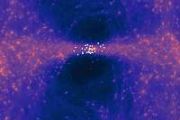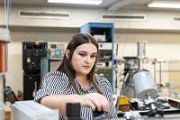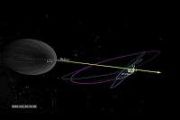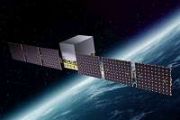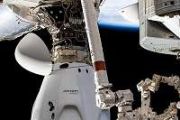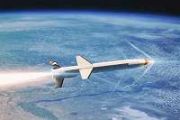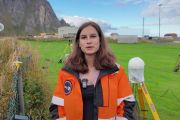
Copernical Team
Crew-12, scheduled to launch on Wednesday 11 February

The crew of four will launch no earlier than Wednesday 11 February at 11:00 GMT/12:00 CET (06:00 EST) from Space Launch Complex 40 at Cape Canaveral Space Force Station, Florida, USA. The next available opportunities are Thursday 12 February at 10:38 GMT/11:38 CET (05:38 EST) and Friday 13 February at 10:15 GMT/11:15 CET (05:15 EST).
AI digital twins aim to protect astronaut mobility on deep space missions
 West Virginia University researchers are developing artificial intelligence tools to help astronauts maintain movement control and overall physical health during long missions in microgravity environments such as space stations, the Moon and future voyages to Mars. Their work centers on building personalized computer models that capture how each astronaut moves and how their muscles are activate
West Virginia University researchers are developing artificial intelligence tools to help astronauts maintain movement control and overall physical health during long missions in microgravity environments such as space stations, the Moon and future voyages to Mars. Their work centers on building personalized computer models that capture how each astronaut moves and how their muscles are activate Space Station study maps hurdles for microbial manufacturing in orbit
 Scientists at the U.S. Naval Research Laboratory have completed a spaceflight biology experiment on the International Space Station that shows how microgravity reshapes microbial metabolism and constrains biological manufacturing performance during long missions. The work, recently reported in the journal npj Microgravity, highlights both the vulnerabilities and potential of engineered microbes
Scientists at the U.S. Naval Research Laboratory have completed a spaceflight biology experiment on the International Space Station that shows how microgravity reshapes microbial metabolism and constrains biological manufacturing performance during long missions. The work, recently reported in the journal npj Microgravity, highlights both the vulnerabilities and potential of engineered microbes In-space manufacturing, quantum projects part of all-Boilermaker suborbital spaceflight
 Purdue University is expanding the scientific footprint of 2027's all-Boilermaker suborbital flight mission with the addition of onboard autonomous experiments in quantum technology and in-space chip manufacturing.
The experiments, prepared by Purdue researchers, will be housed in research lockers for the flight aboard a Virgin Galactic suborbital spacecraft, dubbed Purdue 1. The lockers j
Purdue University is expanding the scientific footprint of 2027's all-Boilermaker suborbital flight mission with the addition of onboard autonomous experiments in quantum technology and in-space chip manufacturing.
The experiments, prepared by Purdue researchers, will be housed in research lockers for the flight aboard a Virgin Galactic suborbital spacecraft, dubbed Purdue 1. The lockers j Sidus Space advances LizzieSat-4 payload integration with Maris-Tech edge computing system
 Sidus Space Inc has reached a key integration milestone with Maris-Tech Ltd as the companies prepare to fly Maris-Tech's advanced payload aboard the LizzieSat-4 mission planned for launch later in 2026. The step marks the move from planning activities into active hardware testing and platform-level integration for the mission.
Sidus reported that testing of Maris-Tech's payload hardware is
Sidus Space Inc has reached a key integration milestone with Maris-Tech Ltd as the companies prepare to fly Maris-Tech's advanced payload aboard the LizzieSat-4 mission planned for launch later in 2026. The step marks the move from planning activities into active hardware testing and platform-level integration for the mission.
Sidus reported that testing of Maris-Tech's payload hardware is ESA member states back SWISSto12 HummingSat with fresh funding round
 SWISSto12 has secured 73 million euros in financial support from European Space Agency (ESA) member states through the HummingSat ARTES partnership project, reinforcing development and industrialization of its compact geostationary telecommunications platform. The company now has more than 100 million euros in total recent funding after combining this institutional backing with additional capita
SWISSto12 has secured 73 million euros in financial support from European Space Agency (ESA) member states through the HummingSat ARTES partnership project, reinforcing development and industrialization of its compact geostationary telecommunications platform. The company now has more than 100 million euros in total recent funding after combining this institutional backing with additional capita Bright streaks reveal Mercury still geologically active
 A new analysis of Mercury has uncovered hundreds of bright linear streaks on crater slopes that point to ongoing loss of volatile material from the planet's interior, challenging the view of Mercury as a geologically dead and dry world. The work, led by researchers at the Center for Space and Habitability (CSH) at the University of Bern together with colleagues at the Astronomical Observatory of
A new analysis of Mercury has uncovered hundreds of bright linear streaks on crater slopes that point to ongoing loss of volatile material from the planet's interior, challenging the view of Mercury as a geologically dead and dry world. The work, led by researchers at the Center for Space and Habitability (CSH) at the University of Bern together with colleagues at the Astronomical Observatory of Northrop Grumman Boosters Set For First Crewed Lunar Voyage Of Artemis Era
 Two Northrop Grumman five segment solid rocket boosters are taking their place on the launch pad as NASA prepares for the first crewed flight of the Space Launch System rocket under the Artemis II mission from Pad 39B at Kennedy Space Center in Florida, targeted for early February 2026.
The twin solid rocket boosters stand 177 feet tall and each produces 3.6 million pounds of thrust at lif
Two Northrop Grumman five segment solid rocket boosters are taking their place on the launch pad as NASA prepares for the first crewed flight of the Space Launch System rocket under the Artemis II mission from Pad 39B at Kennedy Space Center in Florida, targeted for early February 2026.
The twin solid rocket boosters stand 177 feet tall and each produces 3.6 million pounds of thrust at lif Autophage rocket concept wins EU prize for debris free launch technology
 Alpha Impulsion, a space startup based in Toulouse and Naples, has received a 950000 euro award from the European Union for a major innovation in space propulsion aimed at more economical, efficient, and debris free access to orbit.
The company has been recognized as the first enterprise to gain international acknowledgment for a propulsion solution that from the outset addresses sustainab
Alpha Impulsion, a space startup based in Toulouse and Naples, has received a 950000 euro award from the European Union for a major innovation in space propulsion aimed at more economical, efficient, and debris free access to orbit.
The company has been recognized as the first enterprise to gain international acknowledgment for a propulsion solution that from the outset addresses sustainab Runaway massive stars mapped across the Milky Way
 Astronomers have carried out the most extensive observational study so far of massive runaway stars in the Milky Way, combining detailed measurements of how fast these stars move, how rapidly they spin, and whether they live alone or in binary systems. Researchers from the Institute of Cosmos Sciences of the University of Barcelona (ICCUB) and the Institute of Space Studies of Catalonia (IEEC),
Astronomers have carried out the most extensive observational study so far of massive runaway stars in the Milky Way, combining detailed measurements of how fast these stars move, how rapidly they spin, and whether they live alone or in binary systems. Researchers from the Institute of Cosmos Sciences of the University of Barcelona (ICCUB) and the Institute of Space Studies of Catalonia (IEEC), 

